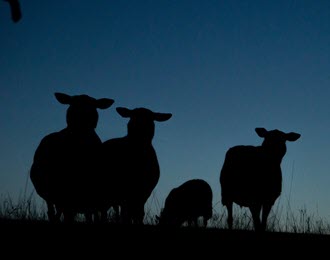Why the shepherds had to watch
25-08-2025 - Posted by Geert-JanOriginally posted on December 25, 2021 – by Andre Piet
Over the timing of Jesus’ birth there is always much discussion. The idea that this happened around Christmas is, biblically speaking, unfounded. Our Christmas is a “Christianizing” of the much older mid‑winter festival celebrated after the winter solstice on December 21. The celebration of the victory of light over darkness. That is a wonderful metaphor (no argument there!), but it tells us nothing about when Jesus was born.
before the Passover
Elsewhere on this site I once argued that Luke 2:42 contains a very interesting clue. There it is about the young Jesus who goes with his parents to celebrate the Passover in Jerusalem. And then we read:
“And when he was twelve years old, while they went according to the custom of the feast…”
Provided we translate and interpret this text very literally, it says here that Jesus turned twelve during the journey to Jerusalem. Since on the fourteenth of the first month (Aviv or Nisan) the Passover began, that would mean his birthday was sometime in the days before that — thus during the trip from Nazareth to Jerusalem. One date stands out: the tenth of Nisan (Exodus 12:3). That was the day when an Israelite household received a one‑year‑old male lamb or goat, which was then slaughtered on the fourteenth. Is this not a wonderful clue that Jesus, with an eye to the Passover (March/April), entered the house of Israel as the Lamb of God?!
shepherds who kept watch
Also in the actual birth story of Jesus we find a subtle clue that his birth took place in spring. In Luke 2 verse 8 we read:
“And there were shepherds in the same region, keeping watch over the flock by night in the field‑fold.”
This refers to the region of Bethlehem and Ephratha, where ancestor David (a thousand years earlier) was also a shepherd. This literal translation of the original text speaks of “the watches of the night.” The plural “watches” evidently refers to shepherds who at different times kept watch through the various night‑watches.
the field‑fold
Most translations read that the shepherds stayed “in the field,” but the Concordant Version, in my opinion rightly, says “field‑fold.” The Greek word (agrauleo; Strong 63) consists of two elements: agros (= field) and aule (= courtyard/hollow). Elsewhere aule is translated “sheep‑fold” or “stable” (John 10:1, 16). Thus the shepherds were in the field near the sheep‑fold, keeping watch in rotation during the various night‑watches.
what is the reason for watching?
But why would shepherds have to keep watch at night if the flock is protected in a walled sheep‑fold? There is one time of year this becomes urgent: lambing season. The most exciting and busiest time of year for a shepherd is the lambing period in early spring, around March/April. Sheep often need help during birth, and with a large flock that takes a lot of effort. The shepherd must constantly keep an eye on the heavily pregnant sheep to be ready to intervene and assist in time where necessary.
lambing season & manger
The mere fact that the shepherds kept watch at night over the flock is a hint toward lambing season. And when precisely these shepherds are told of Jesus’ birth, then the sign is that they would find him in a manger (Luke 2:12). In a feeding trough for the flock. That is called a “sign,” which indicates it has meaning (be‑teken‑is). The child born that day was the true Lamb, born at the appointed (lamb‑ing) time!

 English Blog
English Blog